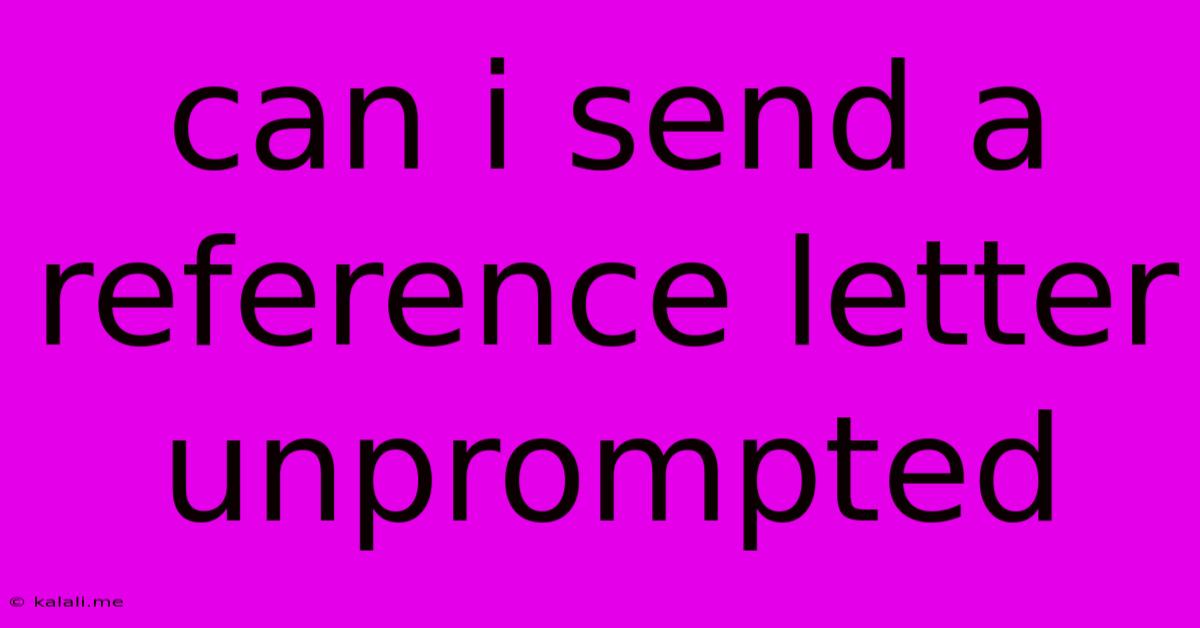Can I Send A Reference Letter Unprompted
Kalali
May 23, 2025 · 3 min read

Table of Contents
Can I Send a Reference Letter Unprompted? A Guide to Unsolicited Recommendations
Sending an unsolicited reference letter might seem like a bold move, but it can be a powerful networking tool and a thoughtful gesture, potentially boosting your professional reputation. However, it's crucial to understand the nuances before hitting send. This article will explore the potential benefits and drawbacks, guiding you on whether and how to send an unsolicited reference letter. Learn the etiquette, timing, and best practices to maximize your chances of a positive impact.
Should you send an unsolicited reference letter? The answer depends on your relationship with the individual and your overall goal. Weighing the pros and cons carefully is essential. This decision involves more than just professional courtesy; it's a strategic career move.
Potential Benefits:
- Strengthening professional networks: Sending a thoughtful recommendation can significantly strengthen your relationships with colleagues and mentors. It demonstrates your support and reinforces professional connections, leading to future collaboration opportunities.
- Boosting your professional reputation: An unsolicited letter, if well-written and relevant, showcases your judgment and ability to identify talent. This subtly enhances your own professional image within your network.
- Creating future opportunities: By recommending others, you might indirectly create opportunities for yourself. Your generosity and keen eye for talent could be noticed by those in positions to advance your career.
- Giving back to the community: Helping others advance their careers is a rewarding act in itself, contributing to a supportive professional community.
Potential Drawbacks:
- Coming across as unprofessional: If done incorrectly, an unsolicited letter could be perceived as presumptuous or even intrusive. It's crucial to tread carefully to avoid any negative impressions.
- Wasting the recipient's time: Busy professionals often have limited time for extra tasks. Ensure your recommendation is truly valuable and justified before sending it.
- Creating awkward situations: If the recipient isn't a strong candidate, your recommendation might reflect poorly on your judgment.
- Misinterpretation of motives: Your intentions should be crystal clear; sending a letter solely to enhance your own network could be viewed negatively.
When to Consider Sending an Unsolicited Reference Letter:
- Strong relationship and clear qualifications: You should only write a letter for someone you know well and whose qualifications you are confident in. Their skills and experience must strongly align with the opportunity they are pursuing.
- Specific opportunity known: It's best to send a letter when you're aware of a specific job or opportunity the person is applying for. Tailor your letter to the specific requirements of that role.
- Permission obtained (where possible): Ideally, get the individual's permission before sending the letter. This demonstrates respect for their privacy and career choices.
- Contextually appropriate: Consider the overall professional environment. In some fields, unsolicited letters are more common and accepted than in others.
How to Write an Effective Unsolicited Reference Letter:
- Clearly state your relationship: Begin by explaining your professional relationship with the individual and how long you have known them.
- Highlight specific accomplishments: Provide concrete examples of their skills and accomplishments, showcasing how they meet the requirements of the target opportunity.
- Quantify achievements: Wherever possible, use quantifiable data to support your claims. Instead of "excellent communication skills," say "consistently exceeded communication targets, leading to a 15% increase in client satisfaction."
- Proofread meticulously: Errors undermine your credibility. Carefully proofread your letter for grammar, spelling, and punctuation errors.
- Keep it concise and focused: Maintain a professional tone and avoid unnecessary details. Focus on the key attributes that make the individual a strong candidate.
In Conclusion:
Sending an unsolicited reference letter can be a valuable networking strategy, but it requires careful consideration and execution. By understanding the potential benefits and drawbacks, following the guidelines above, and ensuring your motives are genuine, you can leverage this powerful tool to enhance your professional network and support the careers of others. Remember that a well-crafted, relevant, and ethically sound letter can leave a lasting positive impression.
Latest Posts
Latest Posts
-
How To Find The Area From Perimeter
May 23, 2025
-
How Old Was Mary When She Gave Birth To Jesus
May 23, 2025
-
Wasting Someones Time Is Stealing Time Talmud
May 23, 2025
-
The Father The Son And The Holy Spirit
May 23, 2025
-
There Was An Error Running Option S1 Wireless Lan
May 23, 2025
Related Post
Thank you for visiting our website which covers about Can I Send A Reference Letter Unprompted . We hope the information provided has been useful to you. Feel free to contact us if you have any questions or need further assistance. See you next time and don't miss to bookmark.